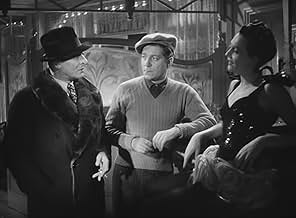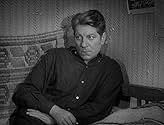Le jour se lève
- 1939
- Tous publics
- 1h 33m
IMDb RATING
7.7/10
8.7K
YOUR RATING
After committing a murder, a man locks himself in his apartment and recollects the events that led him to the killing.After committing a murder, a man locks himself in his apartment and recollects the events that led him to the killing.After committing a murder, a man locks himself in his apartment and recollects the events that led him to the killing.
- Awards
- 1 nomination total
René Génin
- Le concierge
- (as Genin)
Arthur Devère
- Mr. Gerbois
- (as Arthur Devere)
René Bergeron
- Le patron du café
- (as Bergeron)
Marcel Pérès
- Paulo
- (as Peres)
Annie Cariel
- Une locataire
- (uncredited)
Georges Douking
- L'aveugle
- (uncredited)
Georges Gosset
- Un agent
- (uncredited)
- Director
- Writers
- All cast & crew
- Production, box office & more at IMDbPro
Featured reviews
the main setting of "le Jour Se Leve" is the top floor of a french apartment. the film opens with Jean Gabin character Francois - a factory worker- killing a dog trainer named Valentin who we find out (as the story unravels itself) was "involved" with his girl. Francois then barricades himself from the police, and the reason for the death of Valentin is told in simple sets of flashbacks that Gabin remembers between cigarettes as he decides what his next move will be. the story is simple and delicate in manner and substance but nonetheless the director/writer team Marcel Carne and Jacques Prevert succeed in turning the realistic (and sometimes edgy) conversations, movements and places into poetry. and in response to an earlier review, the simplicity of the flashbacks, is what makes the movie so intriguing. instead of relying on a heavy plot that might challenge audience, Prevert and Carne decide to put great detail into a simple tale about a sentimental man who is torn to ruin by a contemptuous and Machiavellian man.
French cinema at its best. Ideas of freedom, entrapment, isolation and realism wound into a great film which is carried by Gabin from the opening scene of the murder, through flashbacks he has remembered to the amazingly brutal final shot. Gabin and Laurent in the factory near the beginning of the movie is poetic realism at its most involving.
Told in flashbacks, the story slowly enfolds to explain the death that started the movie. A very touching love story. The guy is just trying to find a little love in his daily struggle to work a dead end job and make ends meet. There is miscommunication between some couples. Characters are unsure about what it is they really want out of life. Events lead tragically to a death. Trapped in his room by the police, the crowd responds with varying degrees of sympathy and confusion. Was the death inevitable? Those are the questions. In the end, you understand how the situation could have ended differently. You will enjoy this movie.
That was one of the last French masterpieces of the thirties just before the war.Marcel Carné was accused of pessimism and the movie was quickly forbidden by the military censorship that used to say in 1940:"if we've lost the war,blame it on "Quai des Brumes""(Carné's precedent movie.The director answered:"you do not blame a barometer for the storm"). "Le jour se lève " is,if it's possible,darker than its predecessor. From the very beginning,the hero,a good guy (Gabin) is doomed,his fate is already sealed,because the tragedy has already happened .That's why the movie is a long flashback.The memories are brought back on the screen with an astounding virtuosity by some elements of the set (the teddy bear for instance).Only three main characters outside that of Gabin,the evil one (Berry who was to play the devil in "les visiteurs du soir "1942),the lucid one (Arletty) and the ambiguous one (Jacqueline Laurent).The latter provides
the only flaw of the movie:Laurent acts Françoise as the innocent pure girl,however Carné leaves no doubt about her relations with Berry. A remake was made by Anatole Litvak with Henry Fonda ,Barbara Bel Geddes and Ann Dvorak (who must have been studying Arletty's acting for a long while),called "the long night" with an absurd happy end. Needless to say,it's the French Carné movie that you've got to see!
the only flaw of the movie:Laurent acts Françoise as the innocent pure girl,however Carné leaves no doubt about her relations with Berry. A remake was made by Anatole Litvak with Henry Fonda ,Barbara Bel Geddes and Ann Dvorak (who must have been studying Arletty's acting for a long while),called "the long night" with an absurd happy end. Needless to say,it's the French Carné movie that you've got to see!
Thing that this movie is best known and appreciated for is its unique way of storytelling. It's one of the very first movies that features a story that gets mostly told with flashbacks and it keeps switching back between past and present. This storytelling technique was later made more famous and popular by Orson Welles with his masterpiece "Citizen Kane".
But of course a movie requires a bit more than just some good storytelling, though it still remains a very important aspect. But this movie also has a great, quite simplistic movie, with still a lot happening in it, like only the French could make. It's a bit of a sweet love-story, that shows the events leading up to a fatal shooting. Some people will call this movie slow but hey, that was just the way movies were back in its days. But it's not like it's slow pace ever makes the movie a boring or dragging one, or at least not to me. It might had been the case if the movie had been a bit longer but with its running time around 90 minutes, it's simply a short movie to watch.
It's also one beautiful looking movie, that features some great cinematography and especially lighting. Shadows play in important part in the movie its visual look. Amazing thing about its cinematography is that the movie actually had 4 different cinematographers attached to it. No idea what the story is behind this but I guess that each used their own specialty for this movie, or some of them simply got fired or stepped up during production. Anyway, whatever was the case, it really didn't hurt the movie its visual look. Marcel Carné movies often were visually a real pleasure to watch and this movie forms no exception on this.
It's also a movie that quite heavily relies on its actors to tell its story and to deliver its great dialog, that got specially written by poet scenarist and songwriter Jacques Prévert. And this movie luckily had some great actors to work with. At the time Jean Gabin really was one of the best French actors. He really did his best work in the '30's and starred in some other classics such as "Pépé le Moko" and "La grande illusion" during the same decade.
Some great and unique storytelling equals a great and unique movie.
9/10
http://bobafett1138.blogspot.com/
But of course a movie requires a bit more than just some good storytelling, though it still remains a very important aspect. But this movie also has a great, quite simplistic movie, with still a lot happening in it, like only the French could make. It's a bit of a sweet love-story, that shows the events leading up to a fatal shooting. Some people will call this movie slow but hey, that was just the way movies were back in its days. But it's not like it's slow pace ever makes the movie a boring or dragging one, or at least not to me. It might had been the case if the movie had been a bit longer but with its running time around 90 minutes, it's simply a short movie to watch.
It's also one beautiful looking movie, that features some great cinematography and especially lighting. Shadows play in important part in the movie its visual look. Amazing thing about its cinematography is that the movie actually had 4 different cinematographers attached to it. No idea what the story is behind this but I guess that each used their own specialty for this movie, or some of them simply got fired or stepped up during production. Anyway, whatever was the case, it really didn't hurt the movie its visual look. Marcel Carné movies often were visually a real pleasure to watch and this movie forms no exception on this.
It's also a movie that quite heavily relies on its actors to tell its story and to deliver its great dialog, that got specially written by poet scenarist and songwriter Jacques Prévert. And this movie luckily had some great actors to work with. At the time Jean Gabin really was one of the best French actors. He really did his best work in the '30's and starred in some other classics such as "Pépé le Moko" and "La grande illusion" during the same decade.
Some great and unique storytelling equals a great and unique movie.
9/10
http://bobafett1138.blogspot.com/
Did you know
- TriviaWhile not the first film to use dissolves to represent flashbacks, it was considered too new a method in the language of cinema that its producers' insisted on pre-title cards to avoid any confusion.
- Quotes
M. Valentin: You're the type women fall in love with . . . I'm the type that interests them.
- ConnectionsFeatured in Un compositeur pour le cinéma: Maurice Jaubert (1985)
- How long is Daybreak?Powered by Alexa
Details
Box office
- Gross US & Canada
- $35,321
- Opening weekend US & Canada
- $11,864
- Nov 16, 2014
- Gross worldwide
- $35,321
- Runtime1 hour 33 minutes
- Color
- Aspect ratio
- 1.37 : 1
Contribute to this page
Suggest an edit or add missing content































